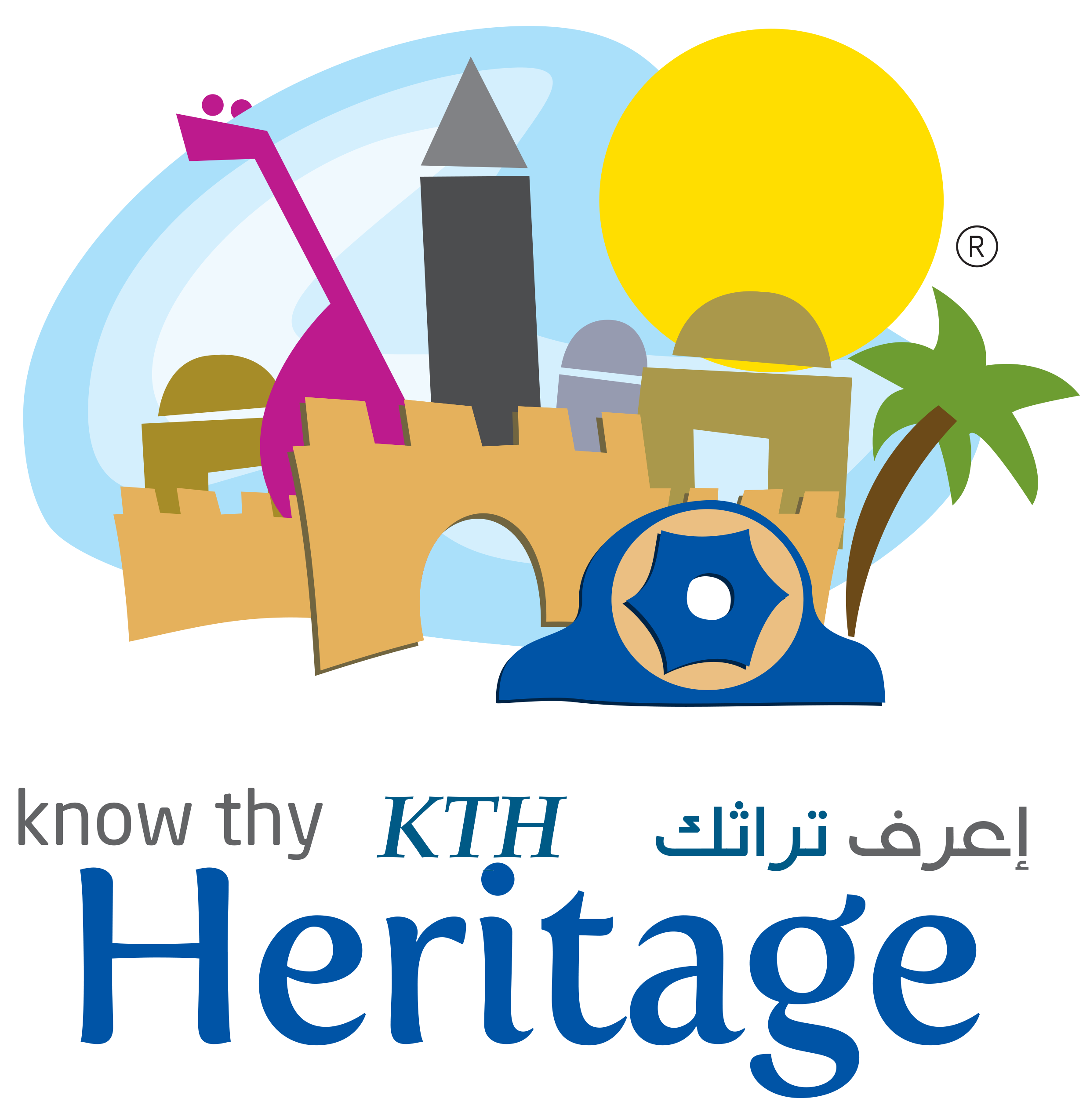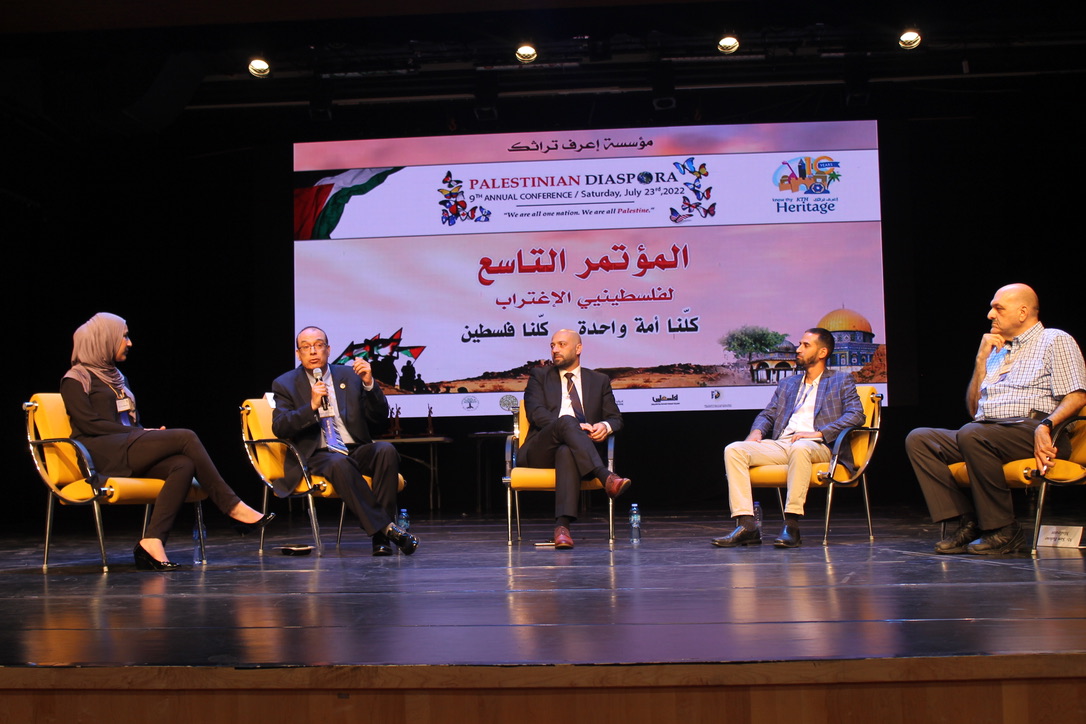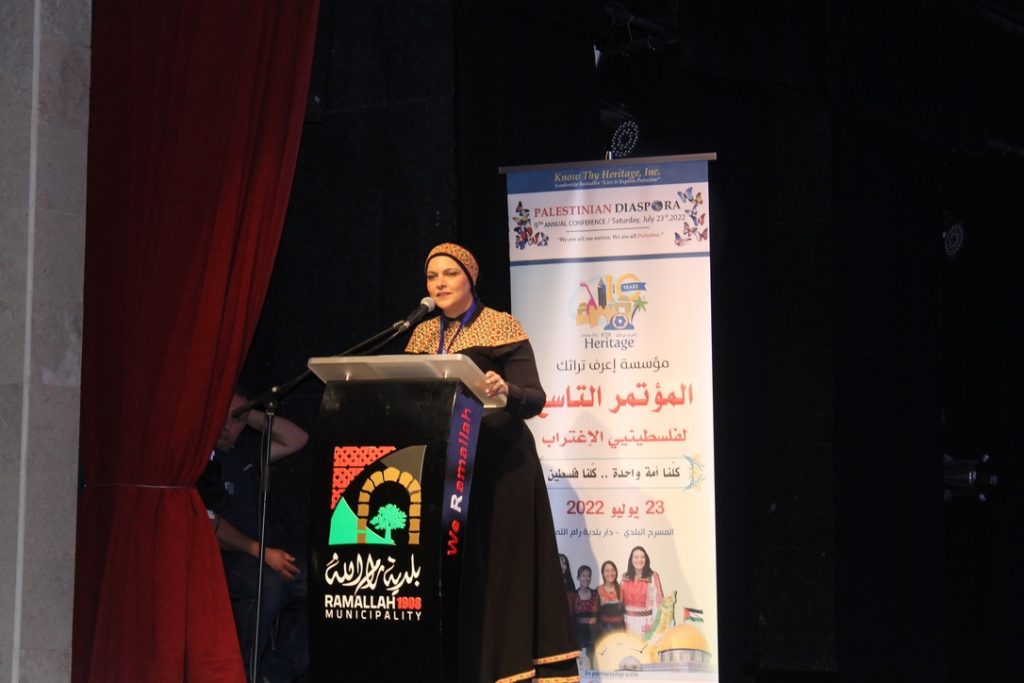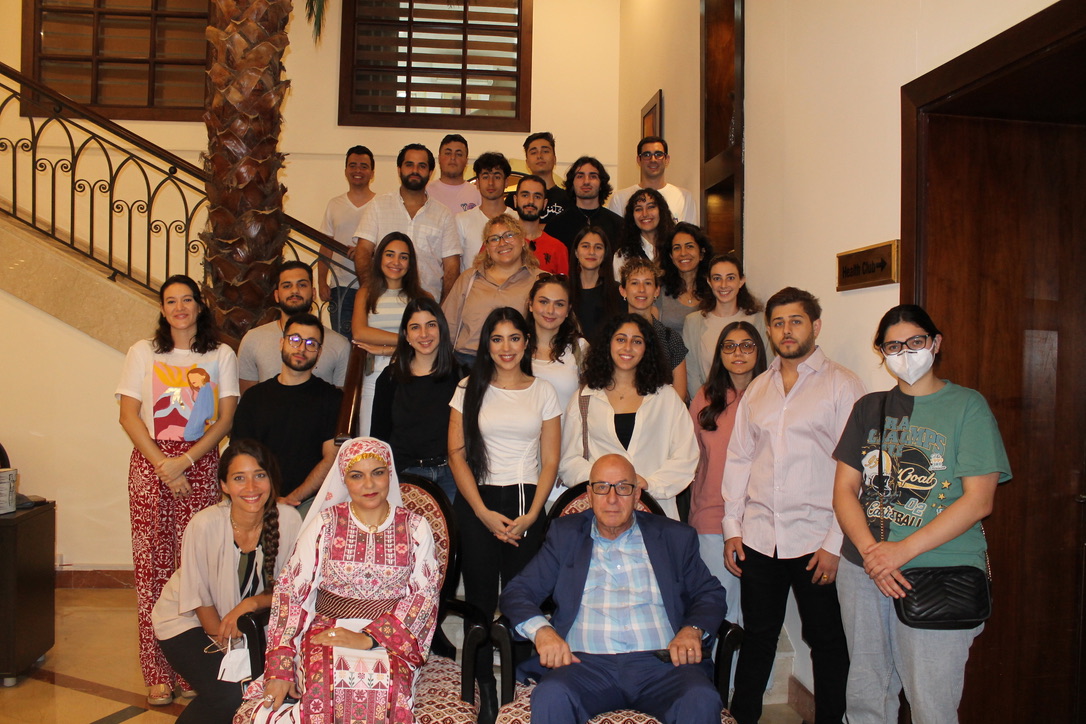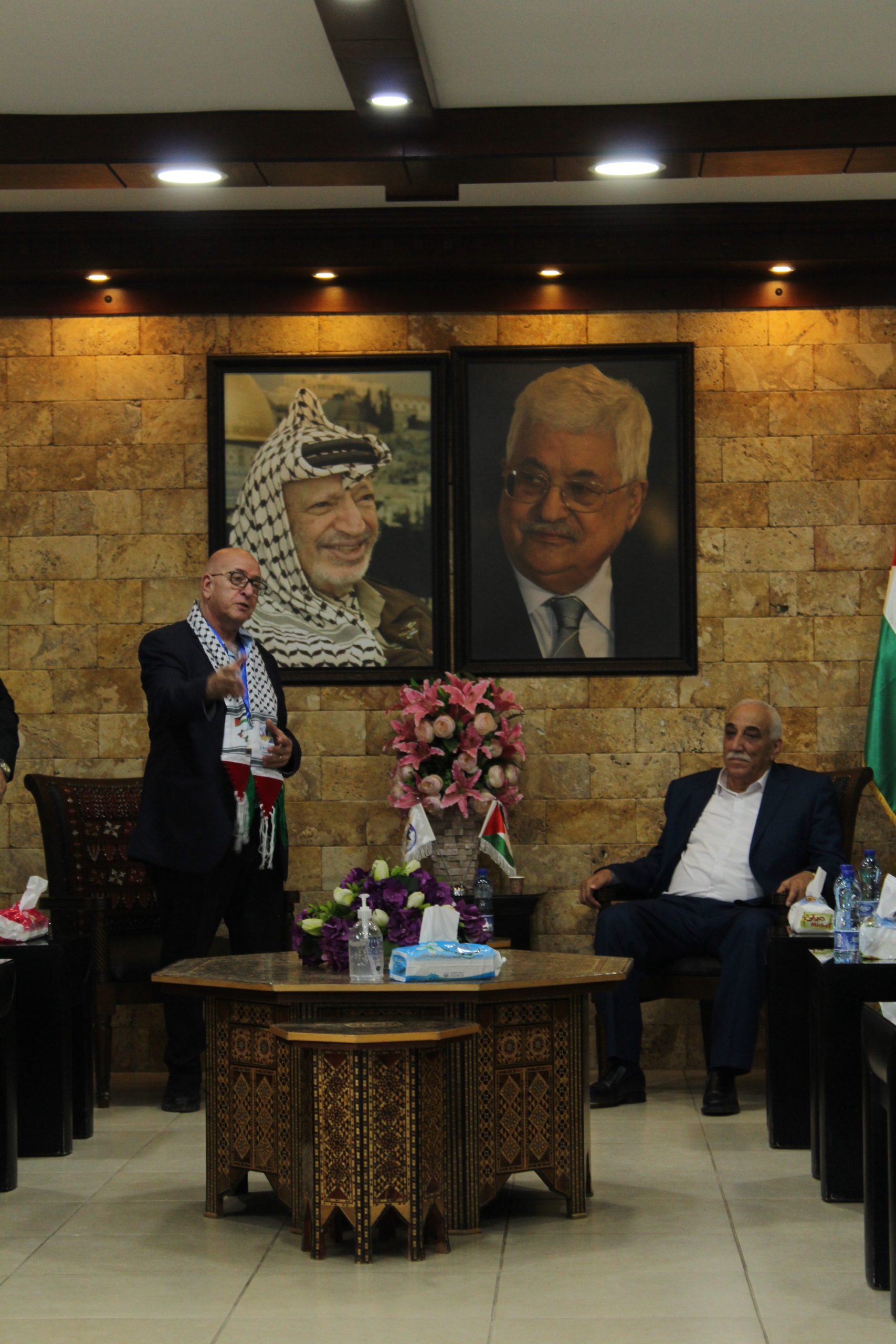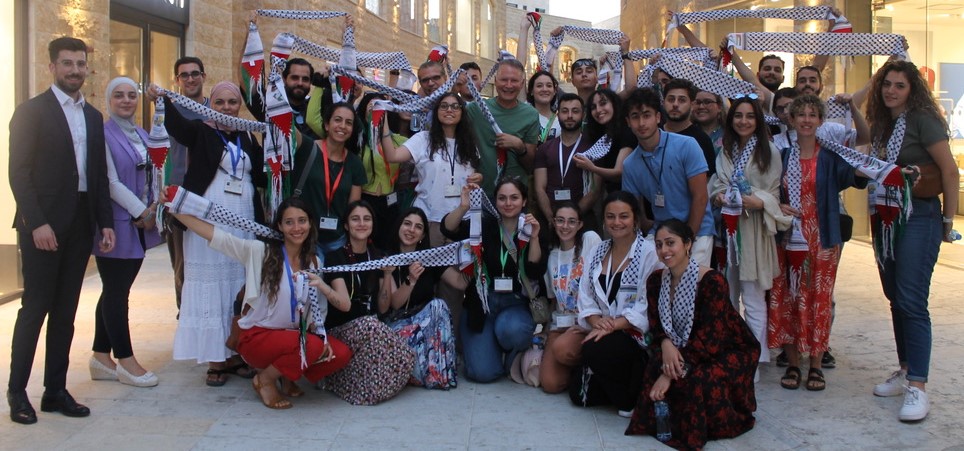KTH 2022 Journey Day 10 – Conference
KTH Conference – Session 1 – Palestine Welcomes her Youth
By: Miriam E.
The day of the Ninth International Diaspora Conference had finally arrived, and we were ready to hear our fantastic speakers open our minds and hearts. Each speaker broadly discussed the roles of the Diaspora and how we can improve the situation of Palestine on the ground by educating people in the countries where we currently live.
We started with an introduction from Sir Rateb Rabie, the Founder, President, and CEO of Know Thy Heritage and the Holy Christian Ecumenical Foundation. He discussed our program and how us, as a diaspora, have a duty to serve Palestine by visiting it but also investing in it. Sir Rateb explained how the organization works with us being leaders and ambassadors for Palestine to our countries and how the shadow board of directors made of our members is the step to being leaders of the organization itself. He described the Palestinian population as a giant we are serving – we must keep the giant alive by activating and involving the diaspora for a free Palestine.
Her Excellency Leila Ghannam was the first speaker and discussed the importance of keeping our culture alive. Palestine is such a tight-knit nation because our culture has been ripped away from us by bulldozing, annexing, and destroying it piece by piece. A large thing that Ms. Ghannam stressed was the importance of speaking Arabic. Our mother tongue carries the stories, the memories, and most importantly, the hopes for a free people who can rebuild and keep the culture alive. The famous saying “the old will die and the young will forget” does not apply to us, as it goes against Israel’s wishes – our love for culture and language keeps the giant Sir Rateb talked about alive. Ms. Ghannam instilled hope by reminding us that we hold onto each other for comfort regardless of the languages we speak because our connection through pain and resilience transcends any will to yield our land.
His Excellency Osama Quasmeh raised similar points as our first speaker, however, his emotion shone through when discussing the struggles of Palestinians. This first segment was welcome to Palestine – part of a welcome is acknowledging the plight of our people whose existence is politicized, humiliated, and ridiculed from birth. He stressed the importance of being representatives to people in our home countries and showing the truth of our struggles. Mr. Quasmeh finished by telling a heartfelt story of not being able to hug his father for the first six years of his life due to this apartheid regime, which struck a chord with us all.
Our wonderful Jennifer Saba, who is a fellow delegate of KTH 2022, spoke on behalf of our delegation. She discussed what can be coined as the “Palestinian dream” of being a triumphant nation, proud of each individual’s successes. However, this dream is constantly torn down; we are now a diaspora who are barred from having the right to return. In an ideal world, this program should not have to exist. However, Jennifer reiterated the important work KTH is doing and how this program has been such an enriching experience and has helped us understand the magical stories we grew up hearing from our family. The poem she read by Mahmoud Darweesh unified our group and made us realize that although this occupation has physically divided us, it has brought us closer emotionally than we could have ever imagined.
Our last two honorable speakers are, in my mind, an iconic duo, as they show a unified approach of Muslims and Christians in this occupation: Imam Maher Assaf and Archbishop Atallah Hanna. Imam Assaf gave us a booming speech that invigorated us all. He spoke stories of grapes and olives being thrown from the arms of women in Al Quds, the disrespect of having an ID that closes – as opposed to opens – more doors, and Israel stealing our land and culture. He spoke of the pain and endurance of Palestinians and urged us to take action to alleviate our people’s suffering.
Archbishop Hanna, on the other hand, instilled a sense of hope in us. He articulated that although the Palestinian culture and land have been stolen, we will always have the best falafel and knafeh. We will always have beautifully decorated thobes, each stitch telling a story. We will always have one of the happiest and most resilient populations who have learned not just to survive but to live despite being told every day that they don’t have the right to exist as who they are.
His heart-warming words to keep our heads up and be proud made me feel energized and strengthened my commitment to my people. Something that stuck out to me was his welcome to us to Palestine but also allowing us the opportunity to welcome him to Palestine as well. This dissolved the separation of being a diaspora versus a citizen of Palestine and was a fantastic ending to this first segment of the conference.
KTH Conference – Session 3 – The Status of the Economy in Palestine
By: Ramez J.
The third session of the day was an informative talk on the current economic conditions in Palestine. Moderated by Mr. Mahir Alawneh, the session covered various topics surrounding the state of tourism and industrial development in East Jerusalem and beyond.
The first speaker, Mr. Raed Saadeh, is the Founder of the Jerusalem Tourism Cluster and Chairman of the Al-Rozana Association. As an expert on tourism in Jerusalem, he identified three primary challenges that the city is currently facing:
- Fragmentation – on a political and social scale
- Detachment – Jerusalem is a city of two physical halves
- Displacement – gentrification/development of historical areas
Saadeh argued that East Jerusalem, or Al-Quds as he preferred to call it, is facing heavy competition for tourism from cities like Ramallah, Bethlehem, and West Jerusalem. The competition from the Israeli side of Jerusalem is especially harmful, as the two parties are essentially selling tourism to the same historical sites. Additionally, Al-Quds is placed at a disadvantaged fact because businesses within the city must abide by Israeli regulations (including labor laws), placing them at a substantial fiscal disadvantage in comparison to other Palestinian cities.
On the other hand, Mr. Saadeh discussed the ample growth opportunities that exist in Al-Quds. The city boasts a strong network of technological infrastructure, which is not being utilized to its full potential. Mr. Saadeh argues that the development and use of design hubs/incubators can advance technological development and foster creativity & innovation within this rapidly growing sector. Despite this, it remains risky to invest in Al-Quds due to the day-to-day uncertainty caused by the occupation.
The session’s second speaker, Mr. Abdo Idrees, is a distinguished businessman and the Chairman of the Hebron Chamber of Commerce and Industry. Mr. Idrees took the time to highlight positive points surrounding the state of the Palestinian economy. For example, Palestine is home to various industries and trades, including commodities like textiles, glass, cement, and olives/olive-based products, among others. Mr. Idrees argues that despite Palestine’s small population and limited land size, there is ample room for growth and investment. Additionally, the unemployment rate remains high in Palestine, and the industrial sector has not reached its full capacity. It was also highlighted that occupation can be positive because it has taught the Palestinian people to be self-sufficient to an extent rather than relying on imports, which can be difficult to secure at times.
Despite an abundance of opportunities for the country, Mr. Idrees also discussed some of the limitations that come with occupation. Palestinians don’t experience many of the luxuries enjoyed worldwide, including easy freedom of movement in and out of the country. He highlighted a fact that’s quite relevant in Palestine’s case: it is nearly impossible to gain a competitive advantage in production and trade while under occupation. Occupying powers tend to restrict the ability of people under occupation to make such gains by limiting or implementing damaging tariffs on imports of raw materials and exports of finished goods.
Overall, the session highlighted that despite the substantial potential for Palestinian economic prosperity, the Israeli occupation has and continues to present major obstacles to achieving that.
KTH Conference – Session 4 – Palestinian Women’s Sacrifices for Palestine
By: Maricel S.
During the 9th Annual Conference for Palestinian Diaspora, Dr. Dalal Saeb Erakat discussed the sacrifices Palestinian women have made for Palestine and was moderated by Dr. Faten Selbayeh, KTH Vice President.
Dr. Erakat is the Vice President of International Relations at the Arab American University in Palestine. During the discussion, she mentioned that Palestinian women should be the 21st-century image of Palestine. It is time to start working on a national brand for Palestine, and it should highlight women.
Palestinian women are often portrayed as poor beggars and victims when, in reality, they are true heroes and martyrs, and the world is not familiar with their stories.
Dr. Erakat shared a few examples, which included Shireen Abu Akleh’s murder, a Palestinian-American journalist who was shot and killed while uncovering the truth under occupation and showcasing the harsh reality of Palestinians during an Israeli military raid on the Jenin refugee camp in the West Bank.
Similar to Shireen, Dr. Erakat shared stories of close Palestinian friends and family who were killed by Israelis on several occasions. There are so many similar stories that Palestinians can share. However, she emphasized the importance of unity and shifted the narrative to ending the Israeli occupation.
Dr. Erakat also highlighted the importance of gender equality in Palestine, especially the importance of including women in higher levels of leadership. Palestinian women are highly educated and competent yet excluded from political and governance decision-making in this macho society. She shared some key data from the Palestinian Central Bureau of Statistics, which showcases that:
* The labor force consists of 17% women
* The National Council consists of 11% females
* 1 woman holds a position as Governor out of 16
* 0 women are part of the PLO executive committee
These statistics demonstrate that opportunities need to be provided to women, allowing them to be more involved to see positive changes and shape the future. After all, Palestinian women are the country’s backbone; they take care of households, and raise and equip future generations.
As Palestinian diaspora, it is important to advocate for Palestine and Palestinian women through global networking and facilitating opportunities to benefit the wider society.
Dr. Erakat concluded her insightful discussion by stating that change is happening. Women are now taught to change reality; they are leaders, entrepreneurs, and scholars who are not afraid of breaking barriers. Throughout history, women have struggled for their political and voting rights. However, education is the way to change the status quo.
KTH Conference – Session 5 – The Nation-Building Role of Palestinians Globally
By: Hala K.
Dr. Mohamed K. Ghumrawi, Mr. Mahir Alawneh, Dr. Lana Shehadeh, and Professor John Dabeet, with Mr. Sam Bahour moderating their discussion, each spoke passionately about how Palestinians in the diaspora could focus their efforts to help Palestine no matter where they live! No matter the points made, the round table circled back to the question of what it means to be Palestinian without a nation, how to nation-build, and on the challenges of liberation movements in the context of an apartheid state.
“I’m a Palestinian, just like you.” Moderator, Mr. Sam Bahour opened up about the role of the diaspora in contributing to Palestine’s liberation. It’s called civil society to lead the battle for liberation.
This reminded me of an interview with a Palestinian elder. She was asked to respond to the question, “What if you were Palestinian?”. She responded, “If you were to do a study on all the Palestinians that live all around the world, you would find the same result: a broken heart from not being able to return to Palestine.”
This panel reminded me of my heartbreak. However, it also made me realize the powerful role the diaspora can play from outside the country.
In particular, what we saw in Palestine can give us the tools and experiences to build our careers to support Palestine. Architects design housing and build systems, engineers implement these systems, politicians keep their governments accountable, educators educate about the truth of Palestinian resistance, and so much more.
While the panel painted hope for our future, Lana Shehadeh reminded the audience of the dirty laundry that needs to be addressed before the nation can be successfully built. She talked about the failures of our leaders to realize self-determination. She opened up about her difficulty in openly expressing her criticisms. This gave us the rude awakening that the struggle for nation-building isn’t only hindered by the occupation but by Palestinian leaders.
This panel opened my mind and made me realize that I don’t need to live in Palestine to help Palestine. As Dr. Mohamed K. Ghumrawi said: “We are all one nation, whether we live abroad or here.”
